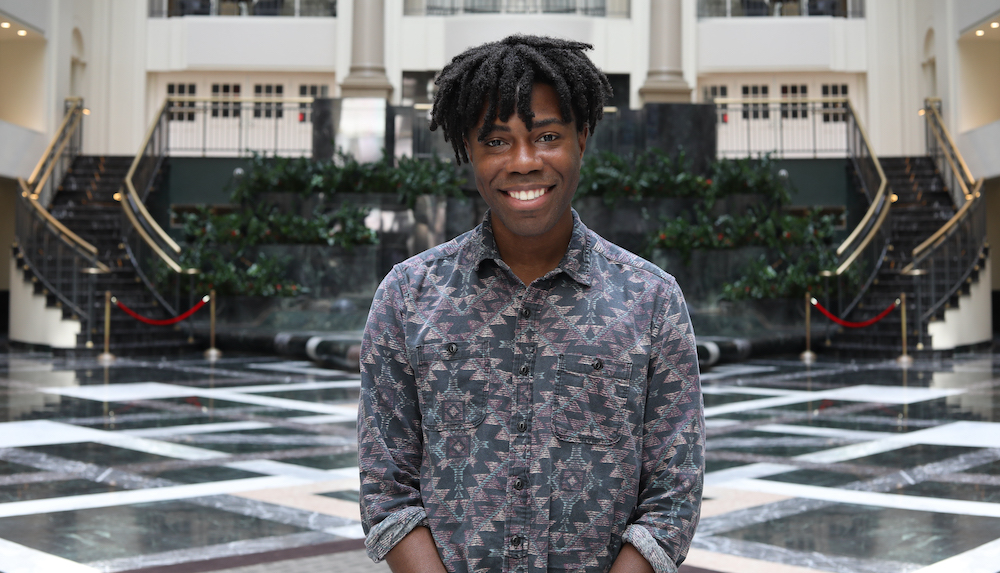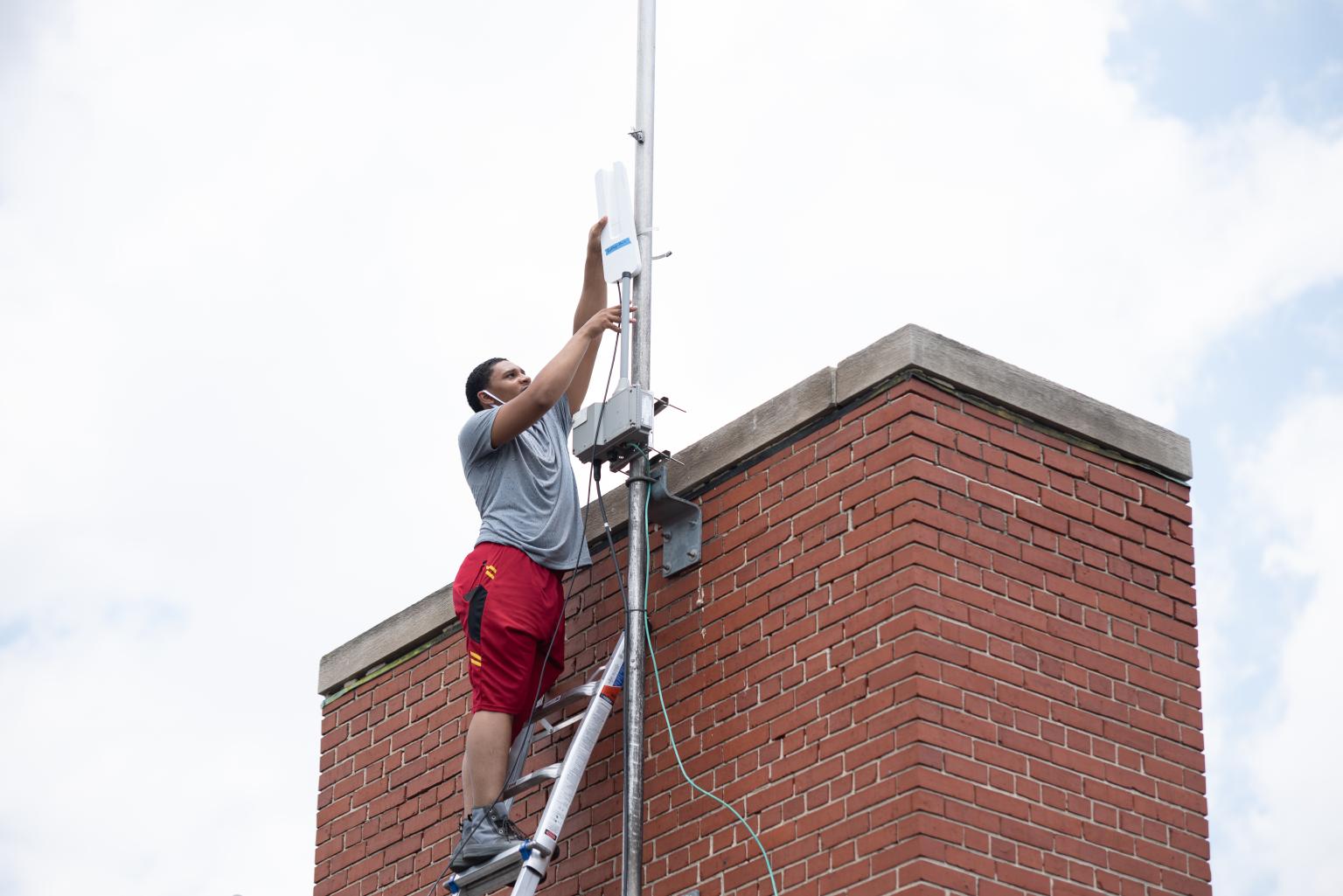Mayor Brandon Scott said last week he is creating the position of director of broadband and digital equity within Baltimore’s city government. The announcement of the position, which is on the mayor’s first-100-day agenda and is expected to be filled this month, comes at a time of urgency around closing gaps in a city where thousands of households lack device and internet access. So, Technical.ly reached out to advocates working on this issue in the community to get their reactions, and what they think this means for the City of Baltimore moving forward.
Technical.ly asked the following questions:
- How’d you feel when you heard the announcement of the position?
- Why do you feel it’s good for the city?
- What’s something the director should address in the first 100 days in office?
Below are their responses, which have been lightly edited:
Jonathan Moore

Jonathan Moore (Courtesy photo)
Moore is the CEO of Rowdy Orb.it, which provides Wi-Fi infrastructure that allows for communities to receive free or low cost internet. Here are his responses to each question:
- I feel great about the position. I hope the incoming candidate has a proven and extensive track record in diversity, equity, inclusion and economic development. But also deep comprehension of the Black Butterfly, along with institutional and structural racism.
- As Mayor Scott continues to make Digital Equity Inclusion (DEI) a focus of his administration, I think it’s a great step in the right direction. When you look at other cities that have put DEI at the center of their administration, the business climate is equitable. It flourishes with increased taxable revenue and upward mobile employment, while opening the door to all aspects of innovation. Communities of color… have the ability to economically move the needle, be in action, and void of the fear of being tossed aside.
- I would love to not see another plan or master strategy that will collect dust. Eventually the individual will have to untangle aspects of the Comcast agreement. But focusing on transparent Key Performance Indicators will allow all members to hold the individual to a higher level, and also better comprehend how the City is moving forward via small obtainable wins.
Chrissie Powell

Chrissie Powell (Courtesy photo)
Powell is the executive director of Byte Back Baltimore, which provides tech training to underrepresented communities, and a founding leader of the Baltimore Digital Equity Coalition.
- We were elated when we saw Mayor Scott’s announcement for the Digital Equity Director position. We still have a long way to go, but to see digital equity and access as a priority for the administration amazing.
- We’re proud to be able to say that Baltimore is among a group of cities nationwide that are seeing digital equity as urgent and necessary. We aren’t the first — Detroit has had a Director of Digital Inclusion for almost two years — but we are among a shortlist of cities who are hiring directors and recognizing digital inclusion as essential at a high level. Digital equity is not something we can silo off under just one government agency because it’s intertwined with so many issues – from K-12 education, to accessing government services, to unemployment benefits, healthcare access, workforce training, and so much more. That’s why it’s smart to have a director at the cabinet level, to make sure solutions are comprehensive and increase equity across the many areas technology touches.
- Luckily, the director won’t have to start from scratch. Baltimore Digital Equity Coalition has been working together for a year now identifying opportunities for digital equity growth. I think the smartest thing in the director’s first 100 days is to form a strong relationship with our coalition to understand Baltimore’s unique situation and start building a comprehensive city-level solution around connectivity, device access, digital skills training and tech support.
Samantha Musgrave

Samantha Musgrave (Courtesy photo)
Musgraves is head of operations at Project Waves, a nonprofit that uses community-based mesh networks to provide free internet to communities in Baltimore.
- I was encouraged by the announcement. A citywide digital equity director signals to the people of Baltimore that the Scott administration is taking the digital divide seriously.
- The addition of a dedicated digital equity director gives organizations and individuals someone to hold accountable as we work to connect everyone in Baltimore to high-speed internet access and advocate for the equitable distribution of digital resources across the city.
- In their first 100 days, I hope the director informs us of how city-owned infrastructure will be leveraged in ways that serve the disconnected and under-connected individuals across the city.
Yair Flicker

Yair Flicker (Courtesy photo)
Flicker is president of software development consultancy SmartLogic, and a member of the Baltimore Digital Equity Coalition that has advocated on behalf of a statewide digital equity office.
- I was thrilled to see the Mayor prioritizing digital equity — digital equity being more than just high speed internet access but equal access to digital skills as well.
- So much of a student’s ability to do well in school is contingent upon their ability to skillfully navigate a computer (or smartphone) and to have access to high speed internet. Furthermore, high speed internet and command of digital skills is the gateway to the knowledge economy and to the corresponding jobs coveted by so many. Additionally, we as a society have a moral responsibility to rectify the wrongs committed over centuries that have caused so many fellow citizens (in particular and disproportionately Black Baltimoreans) to live below the poverty line. Digital equity is an important component in that equation. And while I’m not an economist or policy wonk, it makes intuitive sense to me that any dollar the government spends equipping someone with the tools to get out of poverty will generate an outsized return for the city.
- Meaningfully addressing the digital divide in Baltimore will require a meaningful investment of cash money. The Director will need to build relationships with the City Council, Baltimore City’s lobbyists (those who lobby the Maryland General Assembly for state funds), and of course the cabal of local philanthropists/funders. If the director will have a budget to hire a staff, I think they should hire someone to work solely on the funding side. If they will not have a budget to hire staff, they will need to build an advisory panel to address funding.
Join the conversation!
Find news, events, jobs and people who share your interests on Technical.ly's open community Slack

Baltimore daily roundup: Medtech made in Baltimore; Sen. Sanders visits Morgan State; Humane Ai review debate

Baltimore daily roundup: The city's new esports lab; a conference in Wilmington; GBC reports $4B of economic activity

Baltimore daily roundup: Find your next coworking space; sea turtle legislation; Dali raided and sued


